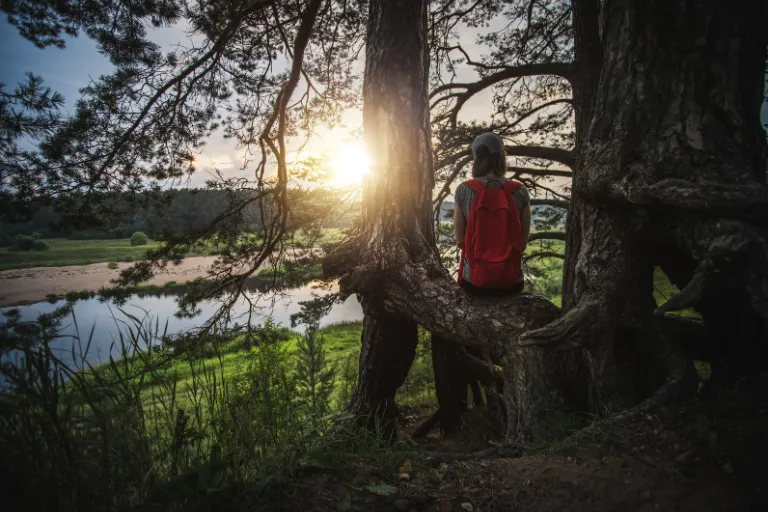Key Highlights
- Allein die Zeit kann geistige Klarheit aufladen und ängstliche Gedanken beruhigen.
- Absichtliche Einsamkeit unterstützt Kreativität, Konzentration und emotionales Gleichgewicht.
- Naturbasierte Traditionen wie Norwegens Friluftsliv bieten eine kulturelle Bestätigung der erholsamen Einsamkeit.
- Die Wissenschaft zeigt, dass moderate, freiwillige Einsamkeit Stressabbau und emotionale Verarbeitung bietet.
- Alltägliche Praktiken —wie kurze gerätefreie Pausen oder achtsame Spaziergänge— machen Einsamkeit erreichbar.
Warum ein Schritt weg Sie wieder zum Leben erwecken kann
Das moderne Leben lässt selten Raum für Stille. Zwischen dem ständigen Ping von Benachrichtigungen, aufeinanderfolgenden Treffen und einem stetigen Strom sozialer Interaktion wird ununterbrochene Zeit allein immer seltener. Untersuchungen deuten jedoch darauf hin, dass diese einsamen Pausen alles andere als müßig sind —sie sind aktive Möglichkeiten zur geistigen, emotionalen und körperlichen Wiederherstellung. Wenn sie absichtlich ausgewählt werden, können sie das Nervensystem beruhigen, Kreativität anregen und das emotionale Gleichgewicht wiederherstellen.¹
Die versteckten Kosten einer ständigen Verbindung
In Kulturen, die ewiges Engagement feiern, wird “immer da sein” oft als produktiv dargestellt. Aber der menschliche Geist war nicht für ununterbrochenen Input ausgelegt. Ohne Rückzugsphasen kann sich Stress ansammeln, der Fokus kann verschwimmen und die emotionale Regulierung kann ins Stocken geraten.² Die Wahl der Zeit allein ist kein Akt der Vermeidung —es ist ein wesentlicher Reset, der Ihnen helfen kann, mit neuer Klarheit zu Ihren Verantwortlichkeiten zurückzukehren.
Erkennen, wann Sie Einsamkeit brauchen
Manchmal sind die Signale subtil: unruhige Gedanken, die sich nicht beruhigen lassen, eine schleichende Reizbarkeit nach längerem sozialen Kontakt oder eine kreative Blockade, die anhält, egal wie sehr man versucht, sich durchzusetzen.²,³ Dies sind keine Anzeichen von Schwäche —es sind die Hinweise des Geistes, dass er Raum braucht. So wie der Körper Schlaf braucht, um sich zu erholen, braucht der Geist Momente der Ruhe, um optimal zu funktionieren.
Die Wissenschaft der Ruhe
Immer mehr Forschungsergebnisse zeigen, dass selbst kurze Intervalle gerätefreier Einsamkeit —nur 15 Minuten— hocherregende Emotionen deutlich reduzieren und die Ruhe fördern können.³ Dieser Wandel fühlt sich nicht nur gut an; er ist mit messbaren Verbesserungen der Stressregulation und der geistigen Klarheit verbunden.⁴
Neurologische Studien deuten darauf hin, dass Einsamkeit das Standardmodusnetzwerk des Gehirns aktiviert, ein System, das mit Vorstellungskraft, Gedächtniskonsolidierung und Problemlösung verbunden ist.⁵ Mit anderen Worten, wenn sich die Außenwelt beruhigt, kann sich Ihre innere Welt neu organisieren, Ideen verbinden und erschaffen. Die Vorteile sind am deutlichsten, wenn die Einsamkeit freiwillig ist,⁶,⁷ was unterstreicht, wie wichtig es ist, die Zeit allein als erholsam und nicht als isolierend darzustellen.⁸
Lehren aus anderen Kulturen
Während das moderne westliche Leben Einsamkeit oft als selten oder sogar verdächtig behandelt, bauen andere Kulturen sie in das tägliche Leben ein. In Norwegen Friluftsliv—“Leben unter freiem Himmel”— ist eine geschätzte Praxis des sanften Eintauchens in die Natur, egal ob beim Spaziergang durch Wälder oder einfach beim Sitzen draußen, auch im Winter.⁹ In Japan ist die Ästhetik von Mutter würdigt die Pause zwischen den Momenten und betrachtet Raum und Stille als entscheidend für das Gleichgewicht.
Interkulturelle Untersuchungen haben ergeben, dass diese Traditionen mit besserer Stimmung, weniger Stress und höherer Lebenszufriedenheit korrelieren.¹⁰ Sie erinnern uns daran, dass es bei der Einsamkeit nicht darum geht, uns vom Leben zu entfernen, sondern gerade weit genug zurückzutreten, um es klarer zu sehen.
Einsamkeit in die Praxis umsetzen
Einsamkeit muss nicht bedeuten, stundenlang zu verschwinden. Beginnen Sie mit kleinen, absichtlichen Pausen—10 bis 15 Minuten, in denen Sie ruhig sitzen, in einem Park spazieren gehen oder ohne Telefon in der Hand aus dem Fenster schauen.³ Bauen Sie mit der Zeit ein “Solitude-Toolkit” auf: eine Lieblingsbank in der Sonne, ein Tagebuch, eine einfache Atemübung.
Wenn man diese Zeit als Wiederherstellung statt als Isolation umformuliert, wird sie lohnender⁷, und regelmäßiges Üben kann zu einem kostengünstigen und wirkungsvollen Instrument für emotionale Widerstandsfähigkeit werden. Wenn sich die Einsamkeit jedoch schwer oder einsam anfühlt, ist dies ein Zeichen dafür, wieder soziale Kontakte zu knüpfen oder sich von medizinischem Fachpersonal beraten zu lassen.⁸
Wählen Sie Ihr eigenes Unternehmen
In einer Gesellschaft, die Geschwindigkeit, Volumen und Sichtbarkeit schätzt, ist absichtliche Einsamkeit eine stille Rebellion. Doch Wissenschaft und Tradition sind sich einig: Die Entscheidung, auch nur kurz zurückzutreten, ist ein Akt der Fürsorge. Ob es sich um eine Morgenpause vor Tagesbeginn, einen gemütlichen Spaziergang am späten Nachmittag oder einen Wochenend-Retreat in die Natur handelt: Sich diesen Raum zu gönnen bedeutet nicht, sich aus dem Leben zurückzuziehen — es geht darum, erneuert dorthin zurückzukehren. Der stille Moment von heute könnte genau die Energie sein, die Sie für morgen brauchen.
Der Artikel stellt in keiner Weise eine medizinische Beratung dar. Bitte konsultieren Sie einen zugelassenen Arzt, bevor Sie eine Behandlung beginnen. Diese Website kann Provisionen für die in diesem Artikel erwähnten Links oder Produkte erhalten.
Quellen
- Thomas V. Benefits of being alone: psychologist insights. The Conversation. April 2025. Available from: https://nypost.com/2025/04/13/health/3-major-benefits-of-being-alone-according-to-a-psychologist
- Hawkley LC, Cacioppo JT. Loneliness matters: A theoretical and empirical review. Ann Behav Med. 2010;40(3):218-227. Available from: https://doi.org/10.1007/s12160-010-9210-8
- Nguyen TV, et al. The effects of 15 minutes of solitude on emotional regulation. J Pers Soc Psychol. 2017. Available from: https://bigthink.com/neuropsych/how-15-minutes-of-solitude-can-change-your-emotional-state
- Thomas V. How solitude helps regulate strong emotions. Futurity. 2017. Available from: https://www.rochester.edu/newscenter/one-hundred-years-solitude-try-15-minutes-instead-283972
- Long CR, Averill JR. Solitude: An exploration of benefits of being alone. J Theory Soc Behav. 2003;33(1):21-44. Available from: https://doi.org/10.1111/1468-5914.00204
- Thomas V, Azmitia M. Motivation matters: Voluntary vs. involuntary solitude. J Adolesc. 2019 Jan;70:33-42. Available from https://doi.org/10.1016/j.adolescence.2018.11.004
- Long CR, Seburn M, Averill JR, More TA. Solitude experiences: varieties, settings, and individual differences. Pers Soc Psychol Bull. 2003;29(5):578-583 Available from: https://doi.org/10.1177/0146167203029005003
- Hawkley LC, Cacioppo JT. Loneliness matters: Health effects of social isolation and loneliness. Ann Behav Med. 2010;40(3):218-227. Available from: https://doi.org/10.1007/s12160-010-9210-8
- Gelter H. Friluftsliv: The Scandinavian philosophy of outdoor life. Can J Environ Educ. 2000;5:77-92. Available from: https://cjee.lakeheadu.ca/article/view/302
- Toyoshima A, Sato T. Preference for solitude and well-being among Japanese adults. Innov Aging. 2021;5(3):1-8. Available from: https://doi.org/10.1093/geroni/igab054




This really resonates. I used to feel guilty for needing alone time, but now I see it as essential